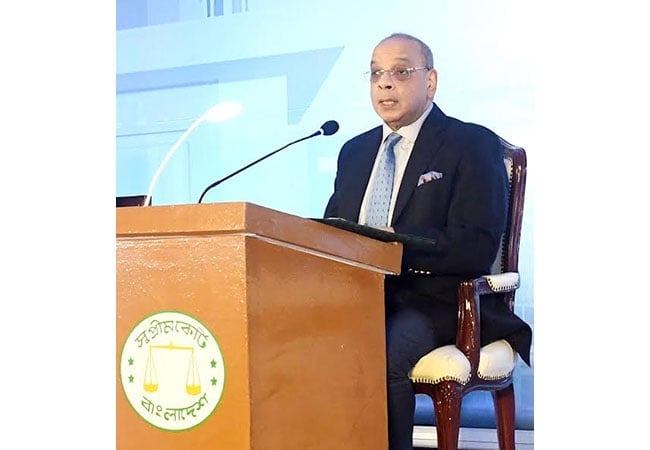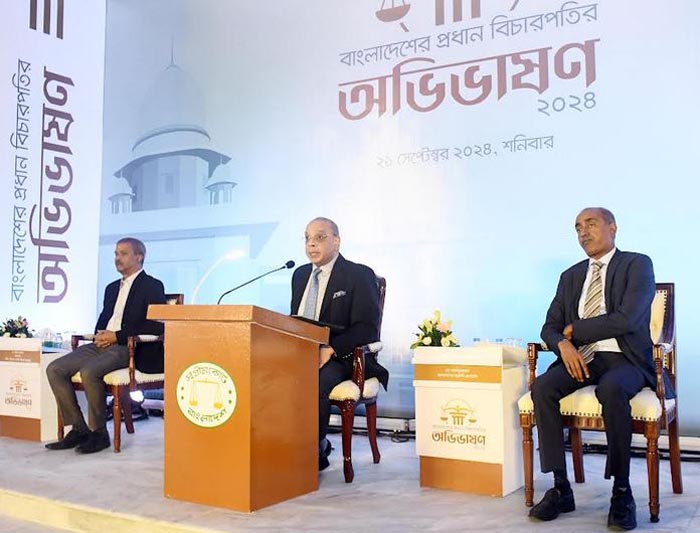
DHAKA, Sept 21, 2024 (BSS) – Chief Justice Syed Refaat Ahmed today announced ‘zero tolerance’ against corruption in the judiciary, stressing the need for formulating a roadmap to regain the public confidence through establishing transparency and integrity in the judicial process.
“Over the years there has been blatant interference in the judiciary. The values of justice have been destroyed and distorted . . . therefore, in this new Bangladesh, we want to build a judiciary which would become a safe fortress for justice through ensuring fairness and the assurance of rights,” he said.
The chief justice said this while addressing all judges, lawyers and judicial officials from across the country at the Inner Garden of the Supreme Court here.
Law, Justice and Parliamentary Affairs Adviser Professor Dr Asif Nazrul and Attorney General Md Asaduzzaman spoke at the function as special guests. Registrar General of the Supreme Court Aziz Ahmed Bhuiyan delivered the welcome address.
Refaat Ahmed said attempts were made to use the judiciary as an instrument of deception, deprivation, oppression and torture, causing a loss to the public confidence in the judiciary.
“But the greatest strength of the judiciary is the trust and confidence of the people. We have to indentify the reasons behind the interruption in the judiciary and the obstacles in this way,” he said, putting emphasise on assessing manpower and infrastructural advantages and disadvantages in the judiciary.
The chief justice also stressed on preparing a roadmap as a way out to build a people-oriented legal system and judicial framework.
“There is no doubt that among the existing problems, the key one is not to separate the judiciary from the executive effectively. We all had been suffering the consequences of it for the last one and a half decade,” he added.
The problems also included lack of transparency and accountability, acute shortage of judges as per case ratio, lack of co-operative spirit between bar and bench, infrastructural crisis in courts and absence of logical and acceptable policy for the transfer and promotion of judges of subordinate courts, the chief justice added.
Besides, Refaat Ahmed said, lack of laws for appointing, making permanent and promoting judges in the High Court and the ignorance to the maintenance of principle of traditional seniority has pulled the judiciary back time and again.

The objective of an equitable judiciary is to protect the people, society and the state by ensuring impartial resolution of disputes within short time at low cost, the chief justice said, adding, therefore, it is most important to make the judiciary separate from the executive and legislature and make it (judiciary) independent.
"Because, the main responsibility of the judiciary is to ensure the rule of law, not the law of the ruler," he said.
Refaat Ahmed drew attention of the government to implement some reforms in the judiciary on an urgent basis so that it (judiciary) can work independently and impartially and sought maximum cooperation in this regard.
He said the aim of this reform will be to overcome the crisis of public confidence in the judiciary and establish an independent, strong, modern, efficient and progressive judiciary.
The chief justice said the full implementation of the Masdar Hossain case verdict is a must to ensure the institutional independence of the judiciary.
He said, according to the Article 116A of the Constitution of Bangladesh, judges of subordinate courts shall be independent in the exercise of judicial functions.
Refaat Ahmed emphasized establishing a separate secretariat on an emergency basis under the Supreme Court for true independence of the judiciary, saying it would be the first step for the reform in judiciary.
A complete proposal has already been prepared to establish the separate secretariat for the judiciary, he said, adding, the proposal would be sent to the law ministry soon.
After the establishment of the judicial secretariat, the chief justice said, one of the tasks to bring about qualitative change in the judiciary would be to ensure the appointment of judges on the basis of merit, honesty and efficiency, going beyond personal liking and disliking.
Ensuring the financial independence of the judiciary is one of the prerequisites for an independent judiciary, he said.
Refaat Ahmed advocated for enacting a specific law over the appointment of Supreme Court judges, saying in many cases politics plays an important role in the appointment of the judges in the apex court, which is completely contrary to the concept of justice.
Terming the backlog of cases as a major problem of the judiciary, he said at present, there are about 42 lakh cases remain pending across the country for disposing of.
Judges of the High Court and Appellate Division of the Supreme Court, Chairman of the Judiciary Reform Commission former Justice Shah Abu Naeem Mominur Rahman, Supreme Court Bar Association President Barrister AM Mahbub Uddin Khokon, Secretary of the Law and Justice Division Md Golam Rabbani, Supreme Court officials and nearly two thousand judges from all over the country were present.